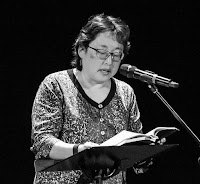Jill Peláez Baumgaertner is a Chicago poet with seven collections to her name. She is also an influential editor — serving first as poetry editor for The Cresset, then for First Things, and finally for The Christian Century — a role she is still fulfilling. She is Professor of English Emerita at Wheaton College, where she also served as Dean of Humanities and Theological Studies.
Her new poetry book is a unique collection — a partnership, really, between Baumgertner and the Romanian sculptor Liviu Mocan. The sculptures, paired throughout the book with Baumgaerner’s poems, clearly stand on their own, and the poems work independently of the images. Even so, when they are considered together the experience is enriched.
Liviu says, “"When my hands touch the marble or the granite or the wood… I touch God's hands. God's hands are there waiting for me… This is how, resculpting His sculptures, I understand, day by day, how inadequate I am. I am a sculptor, I am a sculpture."
Jill says, “We want our book to tell the story that begins in radiance and beauty, progressed through sin to the fall, and leads to revelation and redemption through the vast and tender love of Christ.” This is, in my view, what they have accomplished.
The new book The Shapes are Real (Cascade Books, 2025) is indeed a partnership — and I am privileged to have served as editor. Philip Yancey wrote an introduction to the work of Liviu Mocan for the book, with an afterword by myself, entitled "Polishing Mirrors For Heaven" which also appears in the McMaster Journal of Theology & Ministry.
The following poem is from The Shapes are Real.
The book that reads you
------brass
------120 x 60 x 30 cm
sees you; you standing there
trying to read its opaque pages;
stiff, unbendable they seem
yet stacked with abundance
of breath between leaves and brass
that seem almost flexible..
It eyes you. Over and over
through its hieroglyphs, the tiny eyes
see all that you are, all that you
should be, all that you will be.
They are not meaning―but point
to meaning, harbingers, reflectors,
like the light from the moon―
not sun but sunlight still―
reflected yet substantial,
until the morning erases
dark illuminations and unveils
glory―
revelation the patina
covering sheen in the skin
of mercy.
*This is the fourth Kingdom Poets post about Jill Peláez Baumgaertner: first post, second post, third post.
Entry written by D.S. Martin. He is the author of five poetry collections including Angelicus (2021, Poiema/Cascade), and three anthologies — available through Wipf & Stock. His new book The Role of the Moon, inspired by the Metaphysical Poets, is forthcoming from Paraclete Press.







































